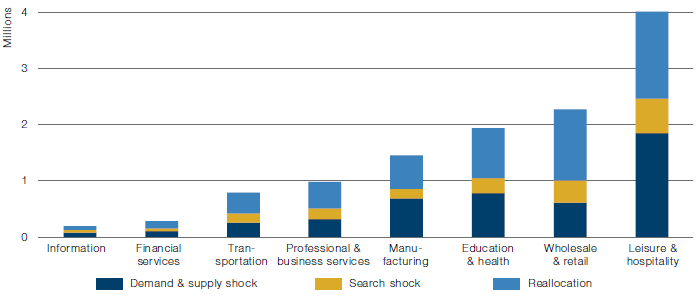The coronacrisis is inflicting a ‘reallocation shock’, which may leave millions unemployed as firms and even entire sectors suffer lasting damage.
“We are seeing unemployment queues in developed economies, particularly outside of Europe, that are probably greater than the Depression of the 1930s,” according to Sharan Burrow, Secretary General of International Trade Union Confederation (‘ITUC’).
The International Labour Organization estimates that in the second quarter of 2020, working hours declined by 10.7% compared with the fourth quarter of 2019; equivalent to 305 million full-time jobs.1 Separately, research by Bloomberg Economics estimates that 30% of job losses between February and May are the result of a reallocation shock, with hospitality and retail sectors facing the greatest damage (Figure 1).
Figure 1. US Job Losses During the Coronacrisis

Source: Bloomberg Economics; as of 14 June 2020.
However, the picture may look even worse for those in ‘informal’ working arrangements, which equates to about 60% of the global workforce, Burrow said on a recent episode of ‘A Sustainable Future’ podcast, hosted by Man Group’s Co-Head of Responsible Investment Jason Mitchell.
Indeed, “1.6 billion out of the 2 billion people working informally are facing destitution”, Burrow said. A key reason for this is because part-time and gig economy jobs are often not subject to the formal employment relationships and lack many of the key benefits associated with full-time work, including health-care support and income security.
And this can result in a vicious cycle: as temporary job losses become permanent, skills are lost and higher unemployment becomes entrenched.
“The question is: will there be reallocation, what we call a ‘Just Transition’, where people sit, talk about how they maintain an economic base and unemployment security, what the redeployment and retraining and income support looks like?” she asked. In fact, there are only “a very few countries geared up to make that possible right now”, including the Nordics and Germany, which invested in re-training and re-skilling employment programmes following the Global Financial Crisis.
Comments may have been edited and condensed for editorial purposes.
1. ILO Monitor: COVID-19 and the world of work, May 2020.
You are now leaving Man Group’s website
You are leaving Man Group’s website and entering a third-party website that is not controlled, maintained, or monitored by Man Group. Man Group is not responsible for the content or availability of the third-party website. By leaving Man Group’s website, you will be subject to the third-party website’s terms, policies and/or notices, including those related to privacy and security, as applicable.